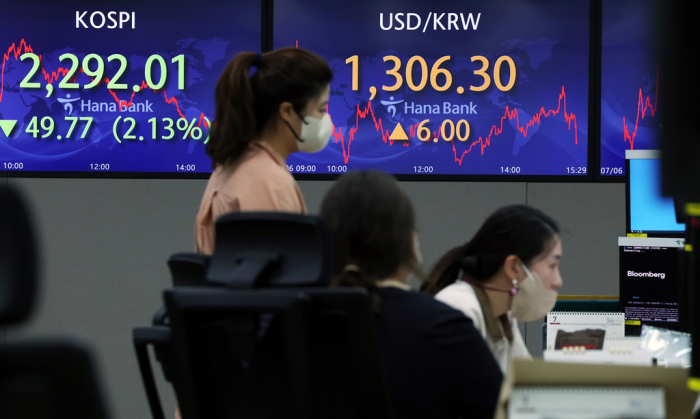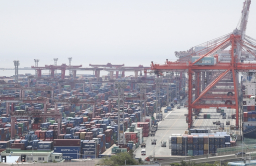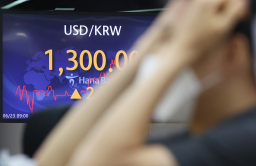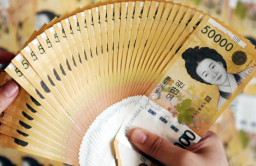-
KOSPI 2592.09 -1.58 -0.06%
-
KOSDAQ 715.98 -1.69 -0.24%
-
KOSPI200 345.28 +0.48 +0.14%
-
USD/KRW 1378 9.00 -0.65%
Saturday May 24, 2025
Korean won forecast to weaken further after hitting 13-year low
Foreign exchange
Korean won forecast to weaken further after hitting 13-year low
The Korean currency is forecast to weaken past 1,350 per dollar this month on recession fears, Fed rate hike
By
Jul 07, 2022 (Gmt+09:00)
2
Min read
News+

The South Korean won is expected to further depreciate after touching its lowest level since the 2008-2009 global financial crisis, on concerns that a potential global recession amid rising interest rates may hurt exports of Asia’s fourth-largest economy.
On Wednesday, the won fell to as low as 1,311 per US dollar, its weakest point since July 13, 2009. The local currency pared losses as the country’s foreign exchange authorities were suspected of selling dollars to support the ailing currency.
The won is forecast to weaken beyond the 1,350 level later this month after the US Federal Reserve signaled the possibility of a 75-basis-point rate hike at its two-day policy meeting that begins July 28, analysts in Seoul said.
The won has shed 9% against the US currency so far this year, becoming the worst performer among emerging Asian currencies. It recorded an 8.6% drop in 2021.
Such depreciation is likely to fan inflationary pressure in Korea as a weaker won usually boosts import prices. Consumer prices rose 6% in June from a year earlier, the fastest pace since November 1998 when the Asian financial crisis hit the country.
The Bank of Korea is expected to raise interest rates on July 13 to curb the rampant inflation, with forecasts of a 50 bp increase for the first time in the central bank’s history.
GLOBAL RECESSION FEARS
Tightening monetary policy at home and abroad has intensified concerns about a global recession, clouding Korea's export-driven economy.
In the US, Korea’s No. 2 overseas market after China, yields on two-year Treasuries briefly rose above those of 10-year bonds for the third time this year on Tuesday, indicating that investors continued to price in the chance that the Fed’s aggressive rate hikes will push the economy into recession.
Such fears also grew in Europe in view of debt risk in Southern Europe and Germany’s trade deficit, analysts said. That pushed the dollar index above 107 while the euro tumbled below $1.02, levels last seen in December 2002.
“Inflation in Europe is accelerating as Russia reduces natural gas supplies to the European Union, while fears over a recession in the region deepened, hurting the euro,” said Moon Hong-cheol, an economist at DB Financial Investment.
Korean exports to the European Union account for about 10% of total overseas sales, according to the nation’s trade ministry.
Korea's exports started showing signs of a slowdown in June with 5.4% growth that month, the country's first single-digit growth in 16 months. The nation already suffered its largest trade deficit for the first half of a year.
Reflecting such concerns, foreign investors have dumped a net 20 trillion won in shares from the domestic stock market so far this year, according to the Korea Exchange. In all of 2021, they sold 26 trillion won.
Write to Mi-Hyun Jo at mwise@hankyung.com
Jongwoo Cheon edited this article.
More To Read
-
Jul 05, 2022 (Gmt+09:00)
-
Jul 01, 2022 (Gmt+09:00)
-
Jun 23, 2022 (Gmt+09:00)
-
May 15, 2022 (Gmt+09:00)






